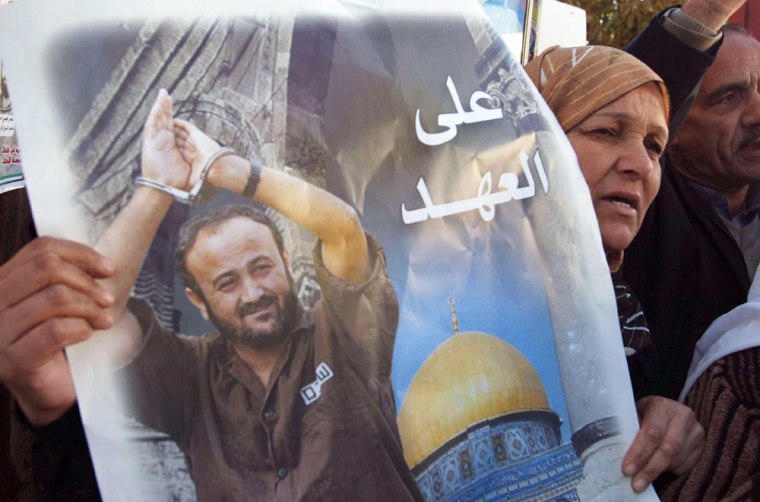To many Palestinians, he's charismatic, charming, intelligent, and brave; and in a world of corrupt leaders he's viewed as an honest broker, a man who never took a penny for himself.
Needless to say, Israelis don't share the same warm sentiment toward the jailed Palestinian leader Marwan Barghouti.
But according to recent opinion polls, it appears the Fatah official may be a real contender to win the Palestinian election and could pose a significant threat to the mainstream candidate, Mahmoud Abbas, in the run to succeed Yasser Arafat.
Is the only problem standing between Barghouti and the Palestinian presidency the fact that he is in jail?
Or, is Barghouti’s run for president just an effort to get concessions from Abbas and he will withdrawal his name ahead of the election?
Respected by diverse base
The 44-year-old father of four is from the village Kobar, near Ramallah and is married to a lawyer, Fadwa Barghouti. Since his student days at Bir Zeit University in the early 1980s, he has earned the respect of divergent political groups, as he did then in the hotbed of political activism at the university.
Barghouti, the leader of the Fatah organization, was first imprisoned by Israel in the late 1970s, for plotting attacks and was later deported out of the country after his release.
He returned to the West Bank in 1994, after Israel and the PLO reached an accord at Oslo, and was then elected to the Palestinian Legislative Council.
Even when Barghouti was in Vienna during his time in exile, he was already tired and fed up at that time with the leadership in the PLO. "I prefer to be in jail, or even to be killed in Palestine, than to live with these corrupt people on the outside," he said at the time.
The intifada, or uprising, that began in 2000 in the West Bank and the Gaza Strip gave Barghouti an opportunity to distinguish his style of leadership from the older generation that had returned from exile after the Oslo accords.
He became a leading figure of the intifada which raised his profile not only among Palestinians at home, but also throughout the Arab world and in the Western press.
Barghouti explained his support for what was actually the second intifada. "We tried seven years of intifada without negotiation (referring to the intifada of 1988), and seven years of negotiation without intifada. Now it's time to try both of them now."
In 2002, Barghouti was captured by Israeli troops and was jailed on charges of heading a militia brigade and orchestrating terror attacks against Israel. He is currently in an Israeli jail serving five consecutive life sentences.
Decision to run
With the death of Arafat last month — the only leader Palestinians had known for more than 30 years — there was a strong sentiment in parts of West Bank and Gaza that it was time for a new generation of leaders.
When it was first announced that Barghouti would run for president of the Palestinian Authority, his supporters were delighted. But after negotiations with Fatah leaders, who visited him in jail, he changed his position, only to reverse himself again on Dec. 1, when he wife submitted his candidacy to the election commission.
Fatah denounced his candidacy and the question now is whether Barghouti’s decision is merely a tactic to win concessions from Abbas and his supporters, or a real pitch for victory.
If, as many suspect, it's a negotiating ploy, then it would have to step out of the race next Wednesday, the deadline for candidates to withdraw.
Palestinian Cabinet minister Kadoura Fares, who is close to Barghouti, raised the possibility Barghouti might withdraw in exchange for promises by Abbas to give a greater say to young Fatah activists.
“A month is a long time,” Fares said. “If Barghouti withdraws his candidacy and lets Abu Mazen [Abbas] win, it shows that Abu Mazen needs to forge an alliance with the younger generation.”
Another Barghouti backer, Ahmed Ghneim, said it’s conceivable his candidate might drop out.
“This is being discussed, but Marwan [Barghouti] said he insists that he wants to continue,” he said, “but there is a lot of talk going on about this issue, we are discussing the issue. And nothing is out of the question.”
Even for Israelis, Barghouti remains an intriguing possibility although his alleged involvement in terror attacks has undermined any sympathy.
Fluent in Hebrew, which he learned while in Israeli jails, Barghouti is that rare Palestinian leader who believes in negotiating with Israel for a two-state solution.
Tight race
In this uncertain climate, two of the latest polls, published on Monday, predicted a very tight race between Abbas and Barghouti, while a third gave Abbas the advantage.
In a poll by the West Bank’s Bir Zeit University, 35 percent of respondents said they supported Barghouti, compared with 34 percent for Abbas.
Another poll by the Palestinian Center for Policy and Survey Research said Abbas had 40 percent support, compared with 38 percent for Barghouti. The results of both polls fell within the margin of error of 3 percentage points.
Only one poll, by the Palestinian Center for Public Opinion, gave Abbas a comfortable lead of 40 percent, compared to 22 percent for Barghouti. That poll had a margin of error of 3 percentage points.
